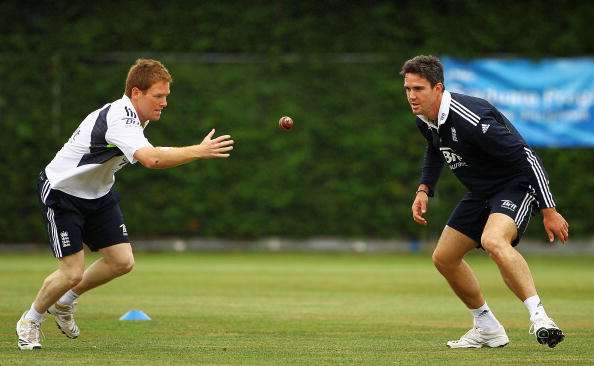By Peter Hayter
Thirteen words were all it took or white-ball captain Eoin Morgan finally to put an end to all speculation over whether Kevin Pietersen might make a return to the England team.
Not many, when set alongside the millions that have been written about him since he was sacked after the 2013/14 Ashes debacle, and by him, in an autobiography described as “317 pages of score-settling”.
Eleven more than the couple his ex-skipper Andrew Strauss used to describe his one-time teammate
during what he thought was an off-air ad break during the MCC match against a Rest of the World XI at Lord’s two summers ago, less than a year before he took over as director of England cricket and expanded those thoughts into the slightly less unkind: “Massive issue of trust between us.”
But more than enough to bring down the final curtain on KP’s extraordinary career and here they are, in full.
In response to a question from another former England captain, now full-time pundit, Nasser Hussain, as to the chances of the 35-year-old Pietersen being selected for the upcoming World T20 in India on the strength of his brilliant form in The Big Bash and The Ram Slam , Morgan said: “That door is completely shut. Kevin will not be picked.”
“That’s from you?” Hussain pressed him.
“That’s from me,” Morgan confirmed.
KP being KP, he was disinclined to let the matter rest there, tweeting: “Interesting he’s saying it’s HIS call! Very interesting! Hmmmmm…!”
But unless, as usual, he’s right and everyone else has got it wrong – again – that surely is that and, as usual, conflicting emotions compete for our attention – again. We have all had and heard more than enough for one lifetime of the historical arguments; great batsman but ego-driven, self-absorbed and a hopeless team man etc. You pays your money….
And it is interesting, if ultimately pointless, to draw comparisons between the current England management’s decision to allow Jos Buttler to play a full season in the Indian Premier League (then come back and play in a Test match a week later if need be) and the split caused by their inflexibility over Pietersen’s desire to do exactly the same back in 2012. Timing is everything…
But for those still baffled as to why England have found it so hard simply to pick him on merit, a look back at how one of his finest hours became his darkest might be appropriate.
The storm had been brewing all summer, from the moment Pietersen made it clear to Strauss and his coach Andy Flower that he resented their insistence on him limiting his IPL opportunities, then briefly quit all forms of international white-ball cricket which ruled him out of the 2012 World T20.
Some have speculated that what he did to the best pace attack in world cricket, on the afternoon of August 4, 2012, the third day of England’s second Test against South Africa at Headingley, was fuelled by anger, frustration and revenge. Whatever caused it, his batting was unforgettable. Where Dale Steyn, Vernon Philander, Morne Morkel and Jacques Kallis made the rest of England’s batting look uncertain and technically limited, Pietersen made them look village.
The faster they bowled, the harder and further he smashed them, scoring 149 in 214 balls, hitting 22 fours and a six. It was brutal, blissful, almost spiritual – and you wanted it to go on forever.
And then a very odd thing happened.
There had been a minor stir when KP had indicated in front of the after-play mics that he wasn’t entirely certain what the future held for him, but, seeking out the always accommodating but occasionally taciturn James Anderson to interview him for his column in The Mail on Sunday, I assumed this would be one of my easier assignments; mention KP and let Jimmy loose on what it was like to watch one of the great innings of both of their careers.
Instead it was like getting blood out of a stone. The more I asked him about Pietersen, the worse it got. The more I mentioned his name, the more that look of stony-faced indifference came over him. All he wanted to talk about, and very pointedly, was how well James Taylor had played at the other end and how Pietersen’s innings would not have been possible without the debutant’s plucky 34 from 104 balls. It was weird, as though Pietersen hadn’t been out there at all. And I was at a complete loss to make head or tail of it until, in the wake of ‘Textgate’ and his omission from the squad for the final Test of that series, another player told me what had got their goat, namely Pietersen’s off-hand attitude towards Taylor before, during, and after the innings.
In his book, Pietersen admitted he had had doubts over whether the Nottinghamshire batsman should have been selected, apparently on account of his size, but whichever account you believe of the many that have passed into folklore, from KP allegedly asking: “Why do I have to bat with a schoolboy?” or, more damagingly, “That was the worst 30 I’ve ever seen” – both of which he denies – there is no doubt he saw no reason to disguise his misgivings in front of his dressing room colleagues. As one of them told me later: “The message he was giving off was that he didn’t rate Taylor and he didn’t care who knew it. It didn’t go down well.”
There are several sides to every story and many versions, of course, and I relate these not to prove any point in particular about one of the most brilliant batsman it has been my privilege to watch, except what a pity it was that the Kevin Pietersen story could not just have been about his batting, because, on his day, it was worth five times the price on the ticket.
Of Pietersen’s 23 Test hundreds, we all have our favourite, from his Ashes-winning 158 at The Oval in 2005, the 227 he scored to help turn the 2010-11 series Down Under England’s way, his mastery of India’s spinners at Mumbai in 2012 (186) and another match-winner against Sri Lanka in Colombo that same year. But never more did he appear to be playing a different game from everyone else as he did against South Africa that amazing day he took on the best in the world and smacked them everywhere and now, in 13 words, it really is all over.
He probably couldn’t care less, but the prevailing feeling from this corner of the room is sadness.
This piece originally featured in The Cricket Paper, Friday February 12 2016












